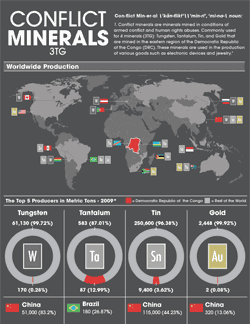What are conflict minerals?
There are varied definitions for conflict minerals. I usually define conflict minerals as minerals that are mined and used to influence and finance armed conflict, human rights abuses, and violence.
I also like Global Witness’ definition of “conflict resources” as “natural resources whose systematic exploitation and trade in a context of conflict contribute to, benefit from or result in the commission of serious violations of human rights, violations of international humanitarian law or violations amounting to crimes under international law”.
Two years ago this term “conflict minerals” hit the US business community with a thud. See, the 2010 Dodd-Frank Act had a small section, section 1502, that mandated companies fully understand their supply-chain and report whether or not they were using conflict minerals – in this case tin, tungsten, tantalum, and gold – from the Democratic Republic of Congo (DRC). The definition used for this law is a specific one and only looks at conflict associated with minerals in the regions of eastern DRC.
In a general sense many more communities around the world must deal with the conflict that mineral extraction brings and/or sustains. These minerals are seen by rebels, armies, and common gangs alike as an easy way to finance their violent agendas that lead to and perpetuate human rights abuses. (Colombia, Zimbabwe)
Click image for complete infoographic. Credit: Venkel
Conflict minerals in the Democratic Republic of Congo
Today conflict minerals are most often associated with the DRC because of international human rights campaigns, section 1502, and the numerous reports documenting the conflict and human rights abuses in the region.
Conflict minerals in the DRC, as listed in Section 1502, include tin, tantalum, tungsten and gold. These minerals lie at the nexus of mining and financing armed conflicts in the country’s eastern region; a region with a decade-long conflict that has produced atrocious human rights violations, gender-based violence, rampant rape, and slavery. Groups earn upwards of $185 million (2008) annually on the trade of conflict minerals.
Dodd-Frank, Section 1502, and conflict minerals
Dodd-Frank, mostly known for as a major financial reform bill, was also a huge step towards curbing the trade of conflict minerals. A small section of the bill, section 1502, is transforming the mining industry and companies – like electronics and jewelry – whose products are reliant on these mined minerals. Dodd-Frank imposes new supply-chain reporting requirements on U.S. companies sourcing conflict minerals from DRC. This is not a ban on minerals from eastern DRC, it simply requires any company using these minerals to disclose whether those minerals originated from eastern DRC.
Congress passed these requirements with the intention of curbing the trade of conflict minerals because:
The intention is ambitious. Now the implementation of 1502 must meet that intention’s ambition. If implemented soon, and enforced properly, 1502 can exemplify how consumer purchasing power and corporate accountability can help combat human rights abuses and transform industries’ supply-chain transparency.
Why are the conflict mining rules delayed?
The passage of Dodd-Frank was a huge step, but getting these requirements hammered into rules has been a tough task. The Security and Exchange Commission (SEC) has been tasked with issuing rules telling companies how to comply with Dodd-Frank. And the SEC has been dragging its feet – it was supposed to issue new rules within 270 days of Dodd-Frank passage. And now it’s been almost double that amount of time – over 530 days… and still no rules. All while people in Congo continue to suffer.
The International Corporate Accountability Roundtable recently highlighted the delay in a group letter to the SEC urging the release of the rules no later that January 2012.
We need action from the SEC
No rules means stalled progress on conflict minerals and dirty gold.
Prompt issuing of the rules is imperative step towards curbing the trade of conflict minerals fueling human rights abuses, murders, and rapes in the DRC. These minerals could be in our phones, on our ring fingers, or in our cars. Congress took action by passing the law; it’s now time for the SEC to step up.
You can take action with us in calling for the SEC to complete the rulemaking process. They have had double the time allotted to issue the rules. Now is time for action. Delay of these rules allows these minerals to continue to be used in the financing of armed conflict and human rights abuses.

